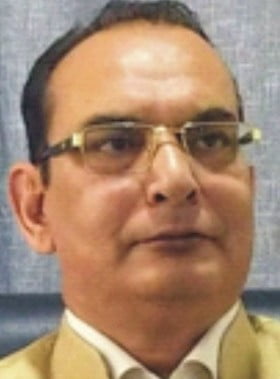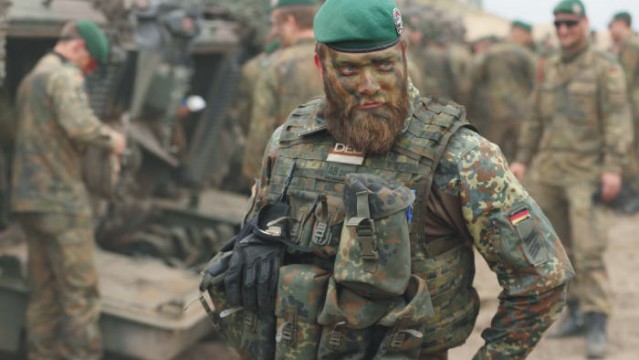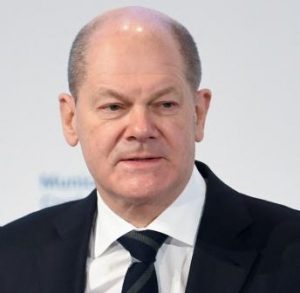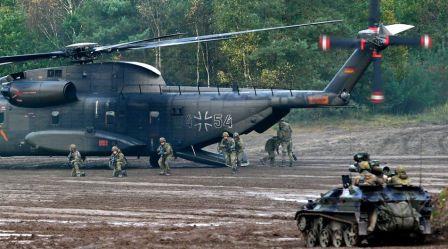

In a historic announcement to the parliament, the German Chancellor, Olaf Scholz, announced on Sunday 27 February additional funding of €100bn (£85bn) to boost Germany’s armed forces, besides a sustained increase in its defence spending over the coming years.
The country which one could say was at the centre stage of the flared up Russian-Ukrainian crisis, has taken the world community by surprise after its latest announcement to boost up its military power.
 Germany was at the centre of the flared–up conflict between Russia and Ukraine as the Nord Stream 2 gas pipeline from Russia to Germany, bypassing Ukraine played a major role in flaring up the sentiments on both sides.
Germany was at the centre of the flared–up conflict between Russia and Ukraine as the Nord Stream 2 gas pipeline from Russia to Germany, bypassing Ukraine played a major role in flaring up the sentiments on both sides.
It was responsible for revenue loss for Ukraine in the first place and secondly it was giving sleepless nights to western and particular American political, geopolitical and military experts and advisers as they could foresee a future with increased Russian influence and it becoming one of the most dominant energy supplier to Germany and Western Europe.
In fact Putin’s expansionist policies have unintentionally achieved what Western allies have long struggled for, to get Germany act with an assertive foreign policy and increase its military might despite its World War guilt.
German Plans

German Chancellor Olaf Scholz received an standing ovation from the Bundestag, when on Sunday he announced a dramatic hike in Germany’s military spending after the Russian invasion of Ukraine. The speech is being heralded as a historic speech as it marks a paradigm shift in German foreign and defence policy.
Scholz said Germany from now on would invest more than 2% of its economic output on defence up from around 1.5 % currently, after years of resisting pleas from NATO allies to do so, and set up a 100-billion-euro ($112 billion) fund to re-equip the military.
More importantly, as per the American desire, he also outlined plans to reduce Germany’s dependence on Russia for its gas needs, thus increasing hopes that Berlin might consider geo-strategic concerns more in all its trade relations.

On Sunday he announced a 100-billion-euro fund – more than double than its last year’s defence budget – to modernise its military, including buying armed drones and new fighter jets, obviously from America significantly.
Scholz described the current conflict as “Putin’s war” adding “the requirement is as much diplomacy as possible without being naive”.
He also assured that Berlin would support its eastern NATO neighbours and stick “without ifs or buts to its alliance obligations”.
German Renaissance
The latest German move could be termed as a German Renaissance as it has for decades faced calls for playing a more dominant role on the world stage commensurate with its size as Europe’s largest economy.
It’s old policies were reviewed and scrutinised throughout the build-up of the Ukrainian crisis, and some leading commentators, particularly amongst its strongest ally – the United States, used to describe Germany as the weakest link in the NATOs western military alliance.
Nord Stream 2 Baltic pipeline from Russia to Germany despite Western allies’ concerns that it would undermine the security of traditional transit country Ukrainewas supported by the successive German governments.
More recently, it resisted calls to cut Russia off the SWIFT global payments system as part of a Western sanctions package, saying it would then struggle to pay for Russian gas.
However, in a 180 degree turnaround, Scholz on 22 February suspended Nord Stream 2 agreement and on 26 February agreed to cut Russia out of SWIFT and said Germany would build up its coal and gas reserves and try to hasten its long-stalled plans to built more LNG terminals.

In the past Germany military generals had long pleaded for more equipment and the current army chief vented his frustration over the long-running neglect of military readiness on LinkedIn on 24 February a few hours after Russia invaded Ukraine.
German forces were drastically scaled down after the end of the Cold War – with the number of battle tanks drawn down from more than 3,500 in the 1980s to 225 in 2015.
Later the forces were trained mainly for missions such as in Afghanistan where the adversary was poorly equipped and not an armed force with the most modern weapons.
More recently, Germany’s new three-way coalition vowed in December, after coming to power, to pursue a more values-based foreign policy reflecting growing anxiety over the rise in authoritarianism worldwide and threats posed by strategic rivals like China.
Thorsten Benner of the Global Public Policy Institute (GPPi) has described the speech as a starting point for a further fundamental re-think as part of Germany’s National Security Strategy that will also have to include challenges posed by China seen in tandem with Russia.
As some other analysts have termed: Germany has just become a normal power, again. ![]()
_____________
Also Read:
Centre’s Opaque Auction Rules For Pulses Rip Off Govt Coffers, Help Millers Strike Rich
Need to amend laws like UAPA to provide for punishment for those who slap false cases
Global Arms Trade: Who are the real winners?
Why not 40 pc tickets for women in Punjab and elsewhere?
Punjab – How a deadly cocktail of Agri-Water-Energy nexus going to destroy it?

Disclaimer : PunjabTodayTV.com and other platforms of the Punjab Today group strive to include views and opinions from across the entire spectrum, but by no means do we agree with everything we publish. Our efforts and editorial choices consistently underscore our authors’ right to the freedom of speech. However, it should be clear to all readers that individual authors are responsible for the information, ideas or opinions in their articles, and very often, these do not reflect the views of PunjabTodayTV.com or other platforms of the group. Punjab Today does not assume any responsibility or liability for the views of authors whose work appears here.
Punjab Today believes in serious, engaging, narrative journalism at a time when mainstream media houses seem to have given up on long-form writing and news television has blurred or altogether erased the lines between news and slapstick entertainment. We at Punjab Today believe that readers such as yourself appreciate cerebral journalism, and would like you to hold us against the best international industry standards. Brickbats are welcome even more than bouquets, though an occasional pat on the back is always encouraging. Good journalism can be a lifeline in these uncertain times worldwide. You can support us in myriad ways. To begin with, by spreading word about us and forwarding this reportage. Stay engaged.
— Team PT


Copyright © Punjab Today TV : All right Reserve 2016 - 2024 |